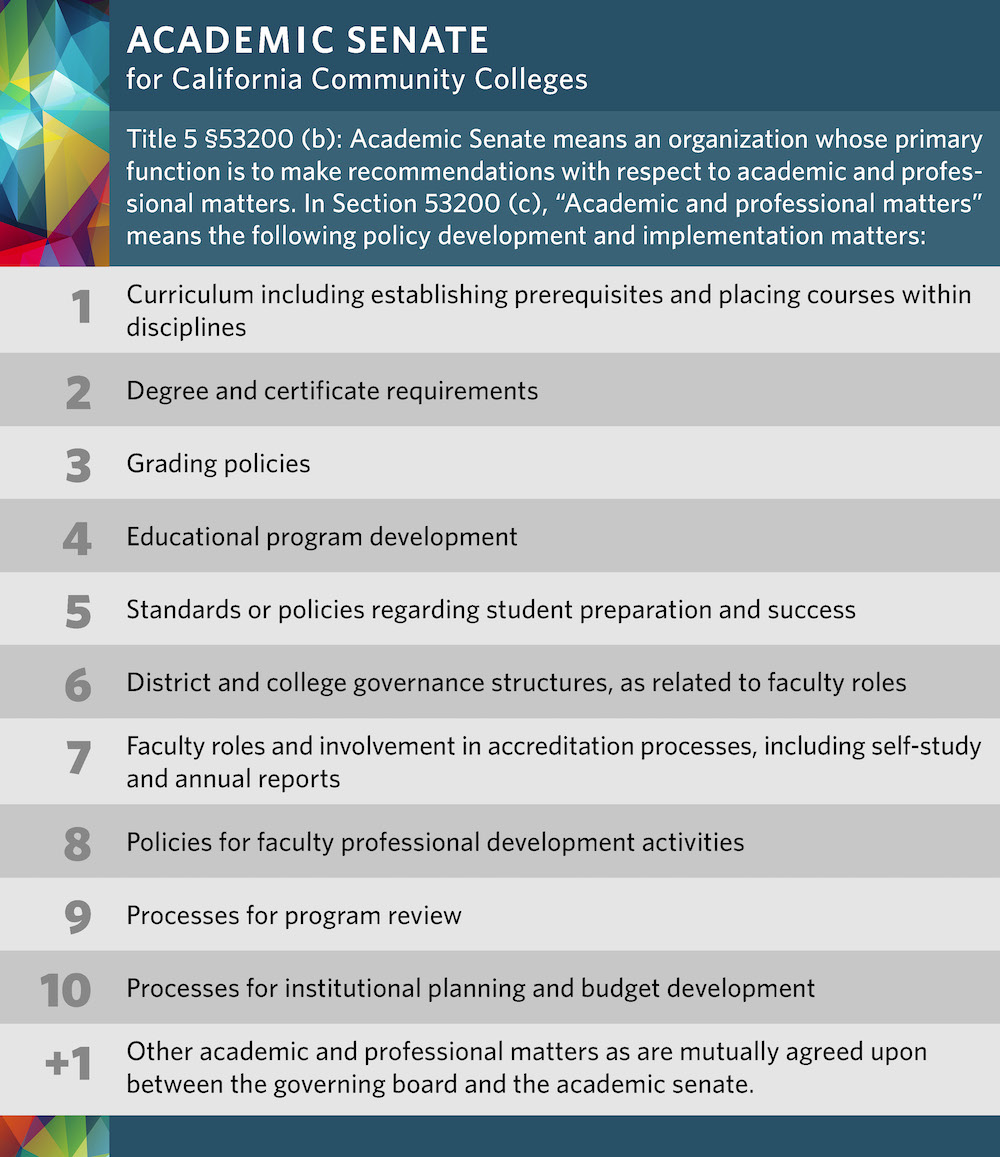
By Annette Owens, CPFA Greater L.A. Regional Representative
This spring, the Academic Senate for California Community Colleges (ASCCC) officially joined the alphabet soup of organizations who are on record supporting the United Faculty (aka: One Tier, One Faculty, Unified Faculty, Single Tier, or Vancouver) model.
As you may know, the ASCCC is the parent organization for all local community college academic senates in the State. It serves as the official voice of faculty in “academic and professional” matters, and is charged with advocating for policies that promote equity, educational quality, and effective governance across the California community college system.
While there have already been concerted efforts of support and advocacy in the past few years from other organizations related specifically to the issues of “working conditions” in the One-Tier model, ASCCC now joins this advocacy from their wheelhouse of academic and professional matters, known as the “10 + 1 areas” (See: graphic below).

There is growing consensus among faculty organizations, advocates, unions, and some legislators that ending the two-tier (part-time vs. full-time) faculty system and moving toward a single-tier model would strengthen academic freedom, promote equity, and better serve both students and the broader educational mission of the California community colleges.
At ASCCC’s Spring Plenary, I was on the floor to lobby for Resolution 111.09 SP2025, which I wrote building on the work of many who have been in the trenches long before me, to support a “United Faculty” aka “One Faculty” model – but focusing on justifications within the State Senate’s purview. Senate delegates from nearly every California community college came together that Saturday morning to hash out and vote for over two dozen resolutions. The resolution was smoothly adopted on April 26th, 2025, and has already been assigned to ASCCC’s Vice President, the Council of Faculty Organizations, and the Faculty Association for California Community Colleges I was fortunate to have the guidance of Robert Stewart, (ASCCC resolution Committee Chair and current ASCCC Vice President) to assist with finalizing this resolution in preparation for the floor vote.
I chose Pablo Martin—recent past Senate President of San Diego Miramar to get the resolution over the finish line at the plenary, because he has a track record of advocating for part-time faculty. In fact, when I was a member of the ASCCC PT Committee, Pablo took on the responsibility of passing the PT faculty equal rights resolution “Supporting Equal Rights for Part-time Faculty 17.03 Fall 2023” (See: tinyurl.com/PTrights).
RESOLUTION 111.09 S25: SUPPORTING A UNITED FACULTY WORKPLACE FOR CALIFORNIA COMMUNITY COLLEGES. (See: tinyurl.com/OneFaculty)
I look forward to working with others to see the One Tier system come to fruition for the next generation of community college instructors. We all must work together; part-time and full-time, unions, senates, and legislative advocates. Further, advocating primarily for locally-bargained incremental steps to accomplish One Faculty is not, in itself, a realistic or legitimate goal. Our goal should be full faculty equity firmly embedded in State legislation.
About the author
Annette Owens teaches digital art and design for both CTE and fine art students at various colleges, including El Camino College in Torrance, CA. She is currently serving as the Greater Los Angeles Regional Representative for the California Part-time Faculty Association (CPFA).
More information about how the “One Tier” or “United / Unified Faculty” model can benefit student outcomes:
- Undoing overreliance on part-time faculty could reverse decline of California Community Colleges By Dr. Debbie Klein
- A Unified Faculty Model: The Remedy for Decades of Failed Education “Reform” in the California Community Colleges by Dr. Debbie Klein
- The American Community College. Third Edition. 1996 by Arthur M. Cohen and Florence B. Brawer
